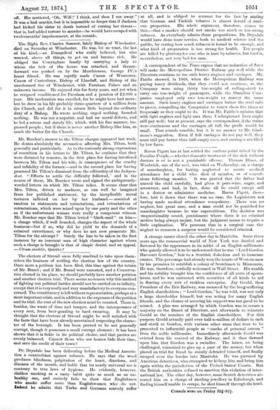Mr. Beecher's answer to the Tilton charges appeared last week.
He denies absolutely the accusation affecting Mrs. Tilton, both generally and particularly. As to the curiously strong expressions of contrition in his letters to Mr. Tilton, he explains that they -were dictated by remorse, in the first place for having interfered between Mr. Tilton and his wife, in consequence of the cruelty and infidelity of the former,—and in the second place for having procured Mr. Tilton's dismissal from the editorship of the Indepen- dent. "Efforts to settle the difficulty followed," and in the -course of these, Mr. Beecher wrote and signed the ambiguously- 'worded, etters on. which Mr. Tilton relies. It seems clear that Mrs. Tilton, driven to madness, as can well be imagined from her published statement, by the inexplicable moral tortures inflicted on her by her husband — assented at random to statements and retractationa, and retractations of retasaations, which were seized upon by one party and the other -as if the unfortunate woman were really a competent witness. Mr. Beecher says that Mr. Tilton levied " black-mail " on him- -a charge which, if well founded, changes the aspect of the whole business—but if so, why did he yield to the demands of a criminal extortioner, or why does he not now prosecute Mr. 'Tilton for the attempt ? Surely the line to be taken in the first instance by an innocent man of high character against whom 4such a charge is brought is that of simple denial, and an appeal, —Utrum creditis, Quirites?






























 Previous page
Previous page